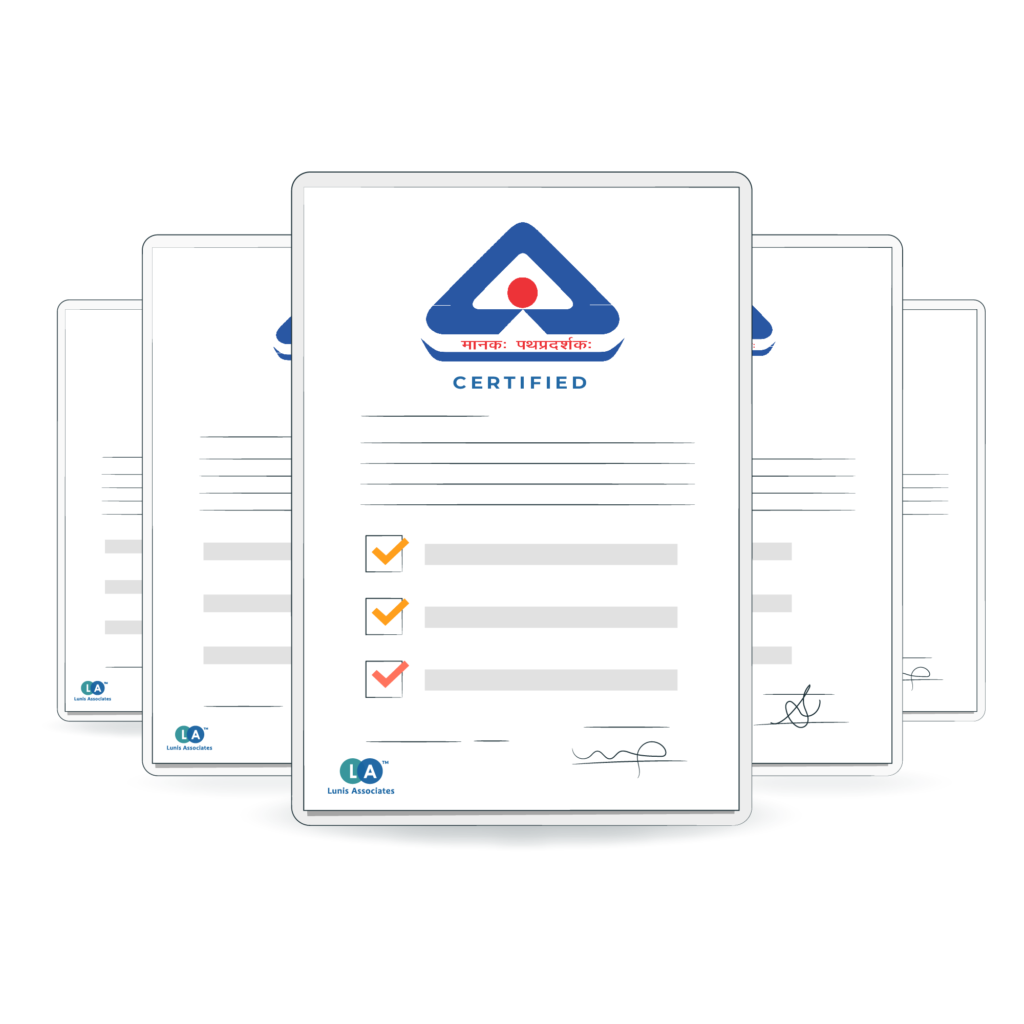Apply Online BIS Certificate in India
- Enhance your product's credibility with a BIS mark.
- Reach us out for an extended support in BIS registration procedure
100+ BIS Successful Registered


100+ BIS Successful Registered


BIS certification matters to companies because it shows that their products adhere to accepted quality and safety standards, boosting consumer confidence, confirming legality, and allowing entry into both domestic and international markets.
The Bureau of Indian Standards (BIS) issues BIS certification in India. The BIS standard mark is a medium for customers to confirm the quality, credibility, and safety of the product they are purchasing.
The ISI Certificate (also referred to as the “standard mark”) may be used on products by license holders to demonstrate them as a BIS-certified product. Products with the ISI Certification in India (Indian Standards Institution) label are also marked for high quality.
The certifications primarily fall under two schemes of BIS:
BIS-Certification (ISI) includes factory inspection (Scheme I, ISI Mark Scheme).
The FMCD (Foreign Manufacturers Certification Department) grants foreign producers BIS ISI accreditation. According to ISI Mark Scheme I, the ISI logo, additionally referred to as the “BIS standard mark” or “ISI Mark,” is displayed on any product that complies with FMCD rules.
BIS-Registration (CRS) Without Factory Inspection (Scheme II)
The BIS registration process under CRS (Compulsory Registration Scheme) was implemented in 2012. In accordance with the rules outlined by the Ministry of Electronics and Information Technology (MEITY), foreign products intended for the Indian market may also get BIS registration under this scheme.
However, the BIS-CRS registration applies to a growing number of goods, making the BIS-CRS registration a little less popular in India.
Obtaining BIS certification offers several significant advantages to a company:

Here’s a list of documents required when applying for a BIS certificate online or offline:
Similarly, many other documents may be required (if applicable).
The BIS certification process comprises two key phases: the licensing process and the surveillance process, each involving specific steps to ensure product quality and compliance.
Surveillance Process:
With a history of over 10,000 happy customers and more than 4 years of focused experience, Lunis Associates is a premier destination for top BIS certification consultants when it comes to being BIS certified. We have a wealth of knowledge, well-thought-out plans, and intelligent minds to help you navigate the BIS certification process with ease. We are your dependable and committed partner on the road to certification achievement since our services cover ISO standards and government licenses. Join forces with us as we set out on this path to guarantee the integrity and conformity of your products. Our commitment is to help you succeed.
The Bureau of Indian Standards (BIS) administers BIS Certification, a legal process that confirms a product complies with accepted quality and safety guidelines. In order to assure adherence to certain Indian Standards (IS), it must undergo thorough testing and review. Once approved, a product may display the ISI mark to demonstrate compliance with certain requirements.
In the context of BIS certification, a license is an official authority given to a producer by BIS. It enables the manufacturer to utilize the ISI certificate mark on their goods to show that they have been tested and meet the necessary Indian standards. The symbol attests to the reliability and safety of the product.
The typical BIS product certification period is two years. As long as the product and the necessary conditions remain the same, manufacturers can readily renew the certification.
Yes, BIS certification is required by Indian law for some products. To verify adherence to safety and quality standards, makers of some products are required to get BIS certification under the Compulsory Registration Scheme (CRS). In order to figure it out, it is critical to confirm whether the CRS applies to it.
To become eligible for a BIS license, manufacturers typically need to provide the following essential requirements, which count: Proof of office and factory address, Documentation showing the establishment of the manufacturing unit (e.g., incorporation certificate) MSME/SSI certificate (if applicable), a list of testing facilities and equipment, etc. Compliance with these requirements ensures a smooth application process for BIS certification and helps demonstrate a commitment to product quality and safety.
✅ By signing up, you agree to our Terms & Conditions and Privacy Policy.

© Pramta Internet Private Limited 2024 Brewed with 
